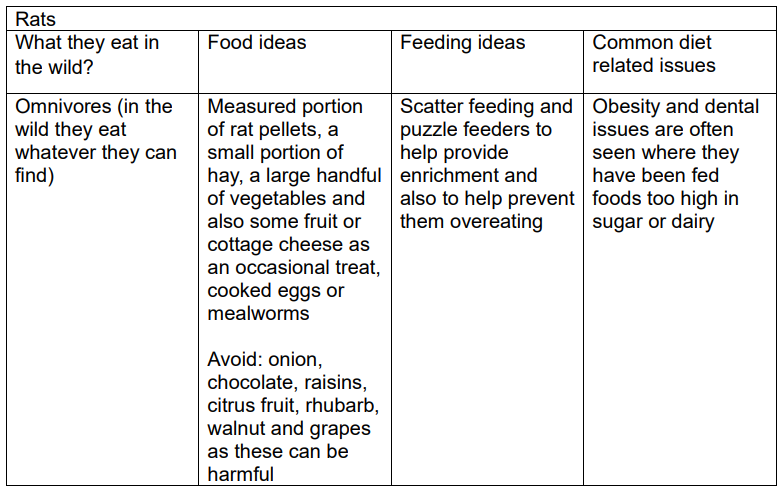The importance of rodent’s diets
- Sep 1, 2023
- 4 min read
One Voice for Animals UK Guest Blog by SPRAW
With Small Pet Rodents Awareness Weeks campaign on Delicious Diets for 2023 going live 18-24 September we thought we would introduce the importance of rodents diets.
When we consider how to give the animals in our lives the best life we can we need to start by considering how we can fulfil the five freedoms 1 for the species we are the guardians of. These are in fact our legal duty under the Animal Welfare Act (2006).
The Five Freedoms |
Need for a suitable environment |
Need for a suitable diet |
Need to be protected from pain, suffering, injury and disease. |
Need to be able to exhibit normal behaviour patterns |
Need to be housed with, or apart, from other animals |
As you can see above, within the Five Freedoms, we need to provide a suitable diet. However we also need to protect them from pain, suffering and disease. A discussed below, feeding the incorrect diet could cause or exacerbate disease or pain. As the Five Freedoms state, it is also important that they are able to exhibit normal behaviour patterns; what and how they eat are a huge part of this and can affect both their mental and physical health.
Rodents, sometimes known as small furries, are often sadly lumped together as one but when it comes to considering their dietary requirements it is important to look at their differing needs.
Guardians, and prospective guardians, must do research about the particular species they share their home with. The welfare and happiness of these fascinating small animals strongly relies on them being kept correctly and being provided with a species appropriate diet. As their guardians it is down to us to consider where they originate from, what their day to day life in the wild would look like (how they find their food) and what they need to eat. Feeding the incorrect diet can cause illness and other issues.
General diet information:
-Make sure food is stored correctly so that it maintains its nutritional value. Any fresh food needs to be kept appropriately and the storage instructions on commercially prepared food should be followed. This normally involves keeping the food in an airtight container.
- Double check the use by date; sometimes buying a big bag for small animal doesn’t work as they won’t have eaten it by the time it goes out of date and starts to lose its nutritional value.
-Check the ingredients of any commercial food used and buy the best quality that you can afford.
-Consider feeding a pelleted food rather than a muesli based food as it prevents selective feeding. If you feed a muesli based diet make sure you feed small amounts and wait until it is all eaten rather than throwing what is left away and refilling. It’s also important to ensure that the amount of peanuts and sunflowers in it isn’t too high as they will often eat these preferentially but they are high in fat and can lead to obesity.
-Measure food out so you know how much is being eaten, or not.
-Always check if there is anything that is toxic to the particular species you are caring for and if in doubt, don’t feed it
-Always make sure there is clean, fresh water
-When changing their diet it’s normally best to do it gradually over a few days to avoid upsetting their stomach (generally it is advised to mix a small amount of the new diet in with the current diet and gradually increase it over a week until they are on the new diet). It’s also a good idea to introduce new treats a little as a time as well, just in case.
-When cleaning out pet rodents who hoard food (such as hamsters), remove some of their hoard but also replace a small amount of it along with some fresh food as they can find it stressful to find their carefully collected hoard gone
Below you can find some information on feeding some of the most commonly seen rodents that are kept as pets. If you are ever concerned about your pet rodent’s diet, or are unsure what to feed them, please contact a rodent friendly veterinary practice or a small animal charity for more information and advice.






There is further research to be done to discover more about our small pet rodent’s needs and preferences. The above is an overview of the current information available but whatever small pet rodent you decide to share your life with it’s vital you spend some time researching their needs so as to provide them with the best life they could possibly have. Often pet rodents can be said to have a short lifespan but to your pet rodent this is their whole life and we need to strive to make it the best life they can have and ensure that they thrive.
About SPRAW
Small Pet Rodent Awareness Week (SPRAW) is dedicated to improving the health and welfare of our smaller pet rodents (hamsters, rats, gerbils, mice, chinchillas and degus) across the UK.
We share advice, welfare information and handy pet care tips on Facebook, Instagram and Twitter, alongside lots of great competitions and daily giveaways. Follow us to stay up to date!
References
Blue Cross. (n.d.). Caring for your gerbil. [online] Available at: https://www.bluecross.org.uk/advice/gerbil/wellbeing-and-care/caring-for-your-gerbil.
Blue Cross. (n.d.). Degu care. [online] Available at: https://www.bluecross.org.uk/advice/degu/wellbeing-and-care/degu-care#anchor2 [Accessed 23 Aug. 2023].
Crouch, K. (2023). Care of hamsters in the veterinary environment. The Veterinary Nurse, 14(2), pp.71–74. doi:https://doi.org/10.12968/vetn.2023.14.2.71.
DEGU CARE. (n.d.). Available at: https://www.rvc.ac.uk/Media/Default/Beaumont%20Sainsbury%20Animal%20Hospital/EXOTICS/Animal%20Care%20Factsheets/Degu-care-and-advice-2022-NS.pdf [Accessed 23 Aug. 2023].
Food, U.P. (n.d.). Chinchilla Nutrition. [online] www.ukpetfood.org. Available at: https://www.ukpetfood.org/information-centre/pet-nutrition-hub/small-mammal-nutrition/chinchilla-nutrition.html.
6HAMSTER CARE. (2020). Available at: https://www.rvc.ac.uk/Media/Default/Beaumont%20Sainsbury%20Animal%20Hospital/documents/Syrian-Hamster-Care-Advice-2020.pdf [Accessed 23 Aug. 2023].
3Knapka, J.J. (1999). Nutrition of Rodents. Veterinary Clinics of North America: Exotic Animal Practice, 2(1), pp.153–168. doi:https://doi.org/10.1016/s1094-9194(17)30145-7.
12MOUSE CARE. (2022). Available at: https://www.rvc.ac.uk/Media/Default/Beaumont%20Sainsbury%20Animal%20Hospital/EXOTICS/Animal%20Care%20Factsheets/Mouse-care-and-advice-Dec-2022-NS.pdf [Accessed 23 Aug. 2023].
RAT CARE. (n.d.). Available at: https://www.rvc.ac.uk/Media/Default/Beaumont%20Sainsbury%20Animal%20Hospital/documents/caring-for-your-rat.pdf [Accessed 23 Aug. 2023].
RSPCA (2017). Animal Welfare Act - RSPCA. [online] Rspca.org.uk. Available at: https://www.rspca.org.uk/whatwedo/endcruelty/changingthelaw/whatwechanged/animalwelfareact.
Rspca.org.uk. (2017). Chinchillas - Chinchilla welfare - Tips, advice, health. [online] Available at: https://www.rspca.org.uk/adviceandwelfare/pets/rodents/chinchillas.
Rspca.org.uk. (2017). Diet - Rats -Pet rodents. [online] Available at: https://www.rspca.org.uk/adviceandwelfare/pets/rodents/rats/diet.
Rspca.org.uk. (2017). Diet | rspca.org.uk. [online] Available at: https://www.rspca.org.uk/adviceandwelfare/pets/rodents/mice/diet.
The five welfare needs. (n.d.). Available at: https://education.rspca.org.uk/documents/1494931/0/FS_The_five_welfare_needs.pdf/971de875-0b75-fb60-1554-c1d08f643126?t=1615290861766.
5Witcomb, B. (2023). Looking after small mammals - rabbit, guinea pig and hamster care. VN Times, 23(6), pp.12–13.
8www.pdsa.org.uk. (n.d.). Your rat’s diet. [online] Available at: https://www.pdsa.org.uk/pet-help-and-advice/looking-after-your-pet/small-pets/your-rat-s-diet.
One Voice for Animals UK has a rescue directory of almost 300 organisations that need support. If you enjoyed this blog, head over and find your local rescue and make a donation















Dr Omole herbal medicine is mighty and genuine,I use to use Mellisa oil and Lavender Healing herbs but result were just still the same,But using Doctor Omole herbal medicine cured my herpes final and I have being living for 2years now No Sores,My herpes is truly gone,Contact him if you interested of his herbal medicine too Dr Omole can as well cure the following....HIV...HERPES,,COPD..FIBROID..ASTHMA..DIABETES..SICKLECELL...ALS..EPILEPSY,,HEPATTITIS...CANCER...LOVE SPELL ...Contact Email; dromoleherbalhome48@gmail.com and also on Whats-app Number Via: +2347042161766 Or https://www.facebook.com/dromoleherbalhome/